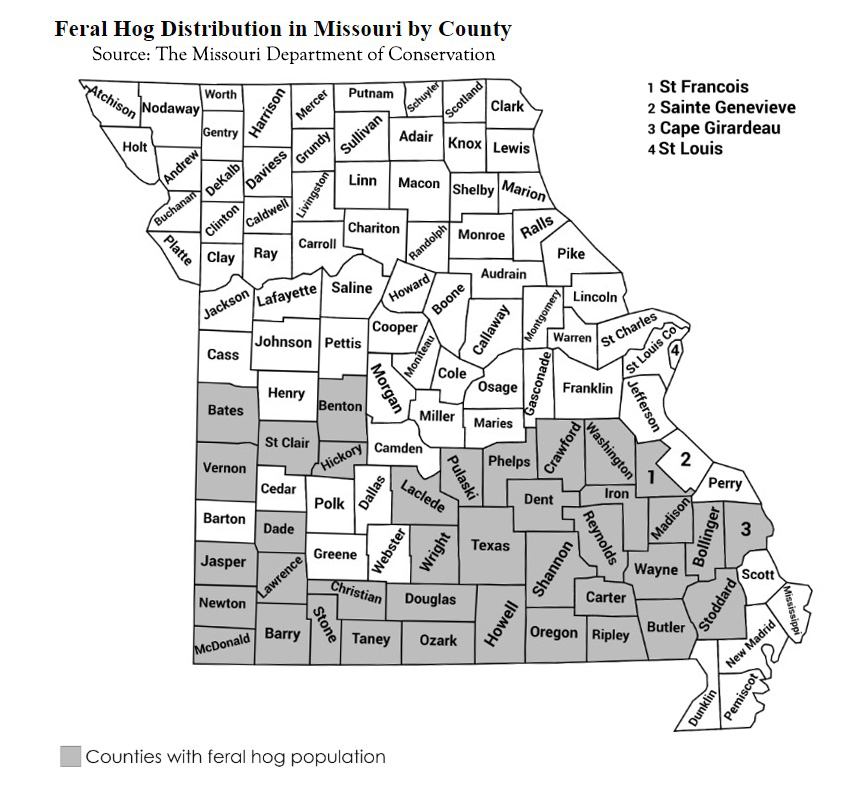
Feral Hogs: Report, Don’t Shoot
In recent years, feral hogs have garnered increasing attention in Missouri as the invasive species continues to encroach northward from the south. In this week’s column, I want to explain to property owners what to do if they encounter feral hogs and also explain more generally why this is a problem that impacts our state’s agricultural industry and therefore our entire economy.
 So why are feral hogs a problem? What do they do that is worse than a domestic pig? According to the Missouri Department of Conservation (MDC), feral hogs breed at an incredible rate, and they destroy agricultural land when they encounter it. A group of feral hogs can literally root up dozens of farm acres over one night. This causes substantial losses to farmers in terms of lost production and time. Feral hogs also cause environmental damage that leads to soil erosion, and they compete directly with native wildlife by eating acorns, a major fall food source for deer, turkey and black bear. Right now, feral hogs are reproducing faster than the MDC can trap and terminate these creatures – this problem is not going away.
So why are feral hogs a problem? What do they do that is worse than a domestic pig? According to the Missouri Department of Conservation (MDC), feral hogs breed at an incredible rate, and they destroy agricultural land when they encounter it. A group of feral hogs can literally root up dozens of farm acres over one night. This causes substantial losses to farmers in terms of lost production and time. Feral hogs also cause environmental damage that leads to soil erosion, and they compete directly with native wildlife by eating acorns, a major fall food source for deer, turkey and black bear. Right now, feral hogs are reproducing faster than the MDC can trap and terminate these creatures – this problem is not going away.
Obviously, I do not believe we have a feral hog problem in suburban areas like St. Louis County, but this issue is becoming relevant in other parts of the 26th Senatorial District. The MDC has been battling feral hogs for years, and they have settled on a strategy of trapping large groups of hogs and terminating them. Hunting feral hogs is discouraged by the MDC because the spread of these animals has come in part from hobby hunters intentionally releasing the hogs in rural areas. The MDC offers the following advice on feral hog hunting:
When hunters shoot feral hogs, it complicates efforts to remove these pests. Hogs are social animals that travel in groups called sounders. Shooting one or two hogs scatters the sounder and makes trapping efforts aimed at catching the entire group at once more difficult, because hogs become trap-shy and more wary of baited sites. With their high reproductive rate, removing one or two hogs does not help to reduce populations. Anyone who observes a feral hog or damage caused by feral hogs should report it to the Conservation Department rather than shooting the animal so we can work together towards eradication.
So what should property owners do if they encounter evidence of feral hogs on their farm or hunting property? They should contact the MDC, who will work with the landowner to set up a trapping and elimination plan. To report feral hogs, call 1-573-522-4115, extension 3296, or go to the department’s website to report the unwanted animal.
With federal and state agencies partnering with property owners, I believe we can make progress on eradicating this invasive species. Feral hogs were eradicated from Missouri once before, and we can do it again.
It is an honor to serve you in the Missouri Senate. Please do not hesitate to contact my office at (573) 751-3678 or by email at dave.schatz@senate.mo.gov if you have any questions or concerns — we are honored to serve you.
